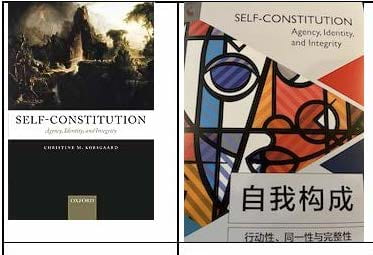

Fellow Creatures: Our Obligations to the Other Animals
Oxford University Press, 2018.
Available on the web through Oxford Scholarship Online
German Translation from C.H. Beck Verlag.
Table of Contents
Part One: Human Beings and the Other Animals
1. Are People More Important than the Other Animals?
2. Animal Selves and the Good
3. What’s Different about Being Human?
4. The Case Against Human Superiority
Part Two: Immanuel Kant and the Animals
5. Kant, Marginal Cases, and Moral Standing
6.Kant Against the Animals, Part 1: The Indirect Duty View
7. Kant Against the Animals, Part 2: Reciprocity and the Grounds of Obligation
8. A Kantian Case for Our Obligations to the Other Animals
9. The Role of Pleasure and Pain
Part Three: Consequences
10. The Animal Antinomy, Part 1: Creation Ethics
11. Species, Communities, and Habitat Loss
12. The Animal Antinomy, Part 2: Abolition and Apartheid


Self-Constitution: Agency, Identity, and Integrity
Oxford University Press, 2009.
Chinese Simplified Language Translation available.
An expansion of my 2002 Locke Lectures, in which I argue that moral principles, and the principles of practical reason generally, are constitutive principles of agency, and that in the course of constituting our agency, we also constitute our own identities. Forthcoming in Chinese.
Available on the web through Oxford Scholarship Online
Table of Contents:
1. Agency and Identity
2. The Metaphysics of Normativity
3. Formal and Substantive Principles of Reason
4. Pracatical Reason and the Unity of the Will
5. Autonomy and Efficacy
6. Expulsion from the Garden: The Transition to Humanity
7. The Constitutional Model
8. Defective Action
9. Integrity and Interaction
10. How to be a Person


The Constitution of Agency
Oxford University Press, 2008.
A collection of papers, mostly published between 1996 and 2005.
Available on the web through Oxford Scholarship Online
Table of Contents:
(Abstracts)
Introduction
Part One: The Principles of Practical Reason
1. The Normativity of Instrumental Reason
2. The Myth of Egoism
3. Self-Constitution in the Ethics of Plato and Kant
Part Two: Moral Virtue and Moral Psychology
4. Aristotle’s Function Argument [Abstract]
5. Aristotle on Function and Virtue
6. From Duty and for the Sake of the Noble: Kant and Aristotle on Morally Good Action
7. Acting for a Reason [Abstract]
Part Three: Other Reflections
8. Taking the Law into Our Own Hands: Kant on the Right to Revolution
9. The General Point of View: Love and Moral Approval in Hume’s Ethics
10. Realism and Constructivism in Twentieth Century Moral Philosophy


 The Sources of Normativity
The Sources of Normativity
Cambridge University Press, 1996
An expanded version of my 1992 Tanner Lectures
In these lectures I identify four accounts of the normativity of moral obligation which have been advocated by modern moral philosophers. I trace their history, showing how each developed in response to the prior one, and compare earlier versions with those on the contemporary philosophical scene. Kant’s theory that normativity springs from our own autonomy emerges as a synthesis of the other three, and in the latter part of the lectures I conclude with my own modified version of the Kantian account. The lectures are followed by commentary from G. A. Cohen, Raymond Geuss, Thomas Nagel, and Bernard Williams, and a reply by me. Also available in Spanish, Japanese, Chinese, Korea, and Italian.
Available on the web through Cambridge Books Online.


Creating the Kingdom of Ends
Cambridge University Press, 1996
A collection of previously published papers on Kant’s moral philosophy and Kantian approaches to issues in contemporary moral philosophy. Also vailable in Korean, and Spanish, and Chinese.
Table of Contents (Abstracts):
Part One: Kant’s Moral Philosophy
1. An Introduction to the Ethical, Political, and Religious Thought of Kant
2. Kant’s Analysis of Obligation: The Argument of Groundwork I
3. Kant’s Formula of Universal Law
4. Kant’s Formula of Humanity
5. The Right to Lie: Kant on Dealing with Evil
6. Morality as Freedom
7. Creating the Kingdom of Ends: Reciprocity and Responsibility in Personal Relations
Part Two: Comparative Essays
8. Aristotle and Kant on the Source of Value
9. Two Distinctions in Goodness
10. The Reasons We Can Share: An Attack on the Distinction Between Agent-Relative and Agent Neutral Values.
11. Skepticism about Practical Reason
12. Two Arguments Against Lying
13. Personal Identity and the Unity of Agency: A Kantian Response to Parfit
Available on the web through Cambridge Books Online.